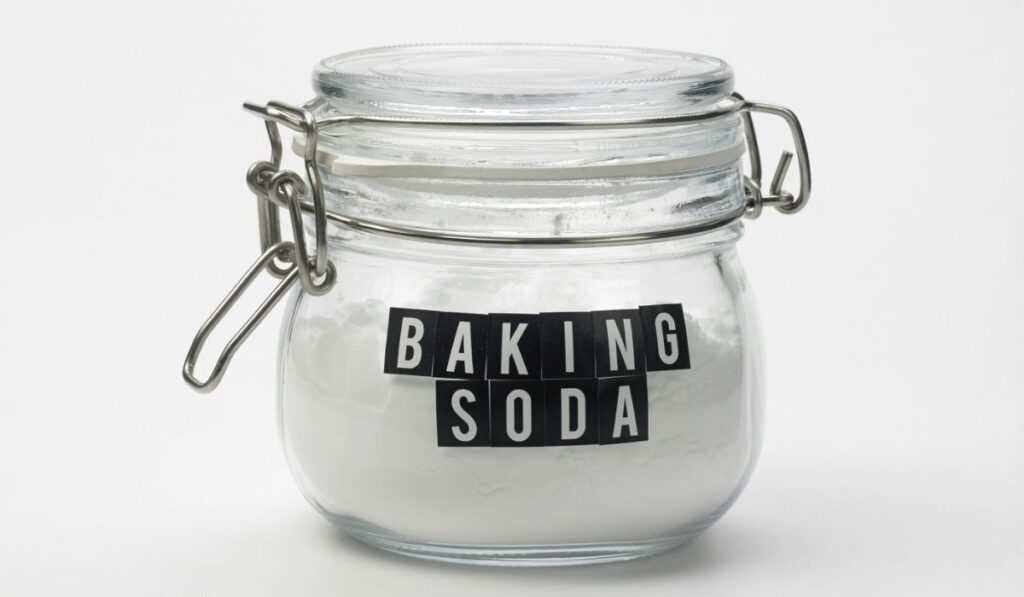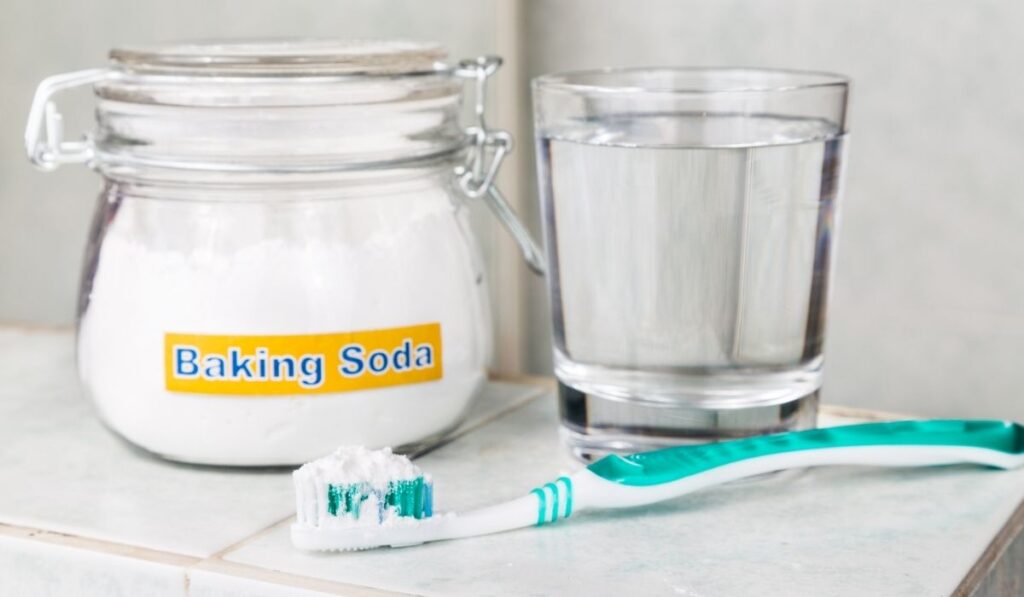For more than a century, baking soda has been a home staple. It’s a component of toothpaste that promotes tooth whitening and is frequently used to remove stains from teeth. However, some people express worry regarding the safety of using it to clean their teeth.
Baking soda can be bad for your teeth if used improperly. It’s a mild abrasive that removes tooth stains and creates an alkaline environment that limits the growth of bacteria. However, you need to be careful when using it because it can wear away the enamel and damage the gums and teeth if misused.
Using baking soda for cleaning your teeth is really a personal choice. You will have to consider the frequency of use and the concentration of the soda /water mixture you make. Before you clean your teeth with baking soda, consider the benefits and drawbacks. It may be useful to consult a dentist too.
Is Baking Soda Bad for Your Teeth?

First, let’s note that baking soda is not harmful and could be helpful for whitening the teeth. While it may not offer the same level of protection against cavities as fluoride toothpaste, it’s considered as a decent tooth cleaner.
Researchers have found that toothpaste containing baking soda has antimicrobial qualities that can help prevent tooth decay, but you need to be careful when using it to clean the teeth.
Baking soda is a mild abrasive that is both alkaline and a bit salty. It efficiently removes coffee, tea, and red wine stains on the teeth. Based on the frequency of use, brushing once a day or occasionally will not damage your teeth, but brushing too often or too hard will severely affect the tooth enamel.
Some people go the extra mile to mix baking soda with other ingredients such as lemon juice or strawberries. But this is not recommended, and you stand a chance to ruin your teeth enamel with improper use of baking soda.
How To Brush Your Teeth Safely With Baking Soda
Having white teeth may significantly increase one’s confidence. Luckily, you don’t have to spend a fortune on teeth whitening products or expert procedures. Brushing or washing your teeth with baking soda may help whiten them, but caution should be exercised when doing so.
Brush with baking soda sparingly and avoid using excessive force to prevent tooth deterioration. Keep in mind that discoloration might show dental problems, so schedule an appointment with your dentist if you haven’t had one in a while.
Steps to Safely Brush Your Teeth With Baking Soda
- Mix baking soda and water in a bowl. Add 14 or 2 teaspoons of baking soda and mix it with enough water to make a paste. Baking soda alone isn’t as effective as a paste made from 2 parts baking soda to 1 part water.
- Do not combine baking soda and any kind of fruit juice to form a paste. When mixed with baking soda or other abrasives, acidic fruit juices can erode the enamel of your teeth.
- Use the baking soda paste to clean your teeth for one to two minutes.
- Brush your teeth gently in circular motions after dipping a soft-bristled brush into the paste. Instead of scrubbing the same region for the full two minutes, use the two minutes to brush all your teeth.
- If you brush too vigorously, you might injure your teeth or gums. The paste can also be applied to your teeth using your hands. Use gentle circular motions and avoid vigorous rubbing.
- When you’re done, rinse your mouth with water. Spit out the baking soda and follow up with a mouthwash or water after brushing for 2 minutes. Be sure to cleanse your toothbrush.
Tips for the Process
Using baking soda on the base of your teeth and along your gum line might irritate receding gums, so avoid doing so. Enamel is hard, but root surfaces exposed due to gum recession are more prone to damage as they are not as hard a substance as enamel.
It’s important to remember not to rinse after using fluoride toothpaste or mouthwash because doing so lowers the therapeutic benefits of the fluoride. As a result, don’t follow up brushing with ordinary toothpaste with a baking soda rinse or brushing.
Also, use as little water as possible while rinsing your teeth after using standard toothpaste.
How Often Should I Brush My Teeth With Baking Soda?
Repeat this process every day for two weeks. A maximum of one to two weeks should be spent brushing your teeth with baking soda paste. After that, do it just once or twice a week at most. The abrasive nature of baking soda may cause tooth decay if you use it too regularly.
Remember that using baking soda to brush your teeth is not a substitute for using conventional toothpaste. To keep your teeth and gums in good working order, brush twice a day with fluoride toothpaste, floss regularly, and schedule frequent dental appointments.
Make an appointment with your dentist to see if you can safely use baking soda to clean your teeth. Baking soda may cause irreparable dental deterioration if your teeth are sensitive to abrasion.
What’s The Best Toothpaste With Baking Soda In It?
Isn’t it true that we all desire white teeth? To get the greatest results with teeth whitening, a variety of products and chemicals are frequently used.
But did you know that baking soda toothpaste is one of the best ways to acquire white teeth? Baking soda is an excellent product for removing stains and restoring the natural whiteness of teeth.
Baking soda is often used in mouthwashes and toothpaste because of its positive strength. The recent rise in popularity of toothpaste containing baking soda is evidence of this. Most individuals rely only on baking soda and related products to combat oral hygiene issues and achieve brighter teeth.
The best toothpaste with baking soda is Crest Fluoride and Soda Baking Toothpaste (on Amazon). In terms of baking soda toothpaste, Crest toothpaste is the most popular and is often used by many.
This bicarbonate of soda toothpaste has a sufficient amount of baking soda to clean the teeth and fight against the most common oral health issues.
In terms of making a variety of toothpaste that can take on the most common oral health issues, the Crest brand is one of the most well-known. As a result, this toothpaste uses baking soda to achieve the goal of whiter teeth and a more radiant smile.
What Are the Advantages of Using Baking Soda on Your Teeth?

Who doesn’t desire white, healthy teeth? Some people spend a lot of money on dental care, while others choose aesthetic dentistry. However, for everyday maintenance, you can use baking soda to keep your teeth healthy. Here is a list of the advantages of baking soda for teeth.
Helps Get Rid of Bad Breath
Bad breath is a major issue since it may cause a lot of embarrassment. It is not harmful to your health, but it may affect your social life.
This is called halitosis. This occurs when sugar and protein residues in the mouth cause an increase in acidity. Rinsing with water and baking soda can help balance acidity and battle foul breath.
Reduces Gum Disease
Gingivitis is a common gum disease caused by plaque formation. The issue is that, because this situation is so widespread, people take it for granted. Untreated, periodontal disease can lead to tooth loss, catastrophic illnesses, and in some cases has been linked to death. However, frequent use of baking soda can help reduce the risk of gum illnesses like gingivitis by preventing plaque buildup.
Prevents and Treats Oral Ulcers
Mouth ulcers are another prevalent oral illness. The recuperation process is long and unpleasant. However, constantly cleaning your mouth with water and baking soda can help cure mouth ulcers efficiently and naturally by regulating the level of acid in your mouth and avoiding future infections.
Whitens Teeth
You may be startled to learn that your favorite whitening toothpaste contains sodium bicarbonate, also known as baking soda. When baking soda is mixed with water or acid, it forms bubbles that may help remove stains, particularly those on teeth. So, if you want healthy, white, clean teeth, start brushing and rinsing with baking soda.
Eases Toothache Symptoms
Toothaches happen fairly frequently for many people, and while most are not fatal, they may be rather irritating. Toothaches can turn your life upside down, as anybody who has experienced them knows.
Rinse your mouth with baking soda to help relieve discomfort. The active component will help balance the mouth’s acid and destroy bacteria, while the salt content may help relieve inflammation and discomfort.
Note, however, that if you are experiencing any type of dental pain, it is always advised to see your dentist for an evaluation.
Balances Out Acidity In The Mouth
Lots of acid in your body might cause several health issues, and the same goes for your mouth. High levels of acid in the mouth can cause halitosis, gingivitis, and mouth ulcers.
Cleaning your mouth with baking soda can help balance the acidity in your mouth and reduce your risk of these illnesses.
Enhances Oral Health
Using baking soda as a toothbrush or mouthwash can dramatically improve dental health. Baking soda is also accessible and cheap.
What Are the Disadvantages of Using Baking Soda on Your Teeth?
Using baking soda to clean your teeth comes with certain hazards.
Can Harm Enamel
Baking soda can erode tooth enamel if not used properly and can lead to needing dental work to repair tooth structures eroded away.
After the second or third cleaning, this may become a major problem. Small particles break enamel, leaving scratches and fissures.
As a result, the teeth become more temperature-sensitive. For up to five days, hot and cold meals might cause acute, stabbing discomfort.
Can’t Stop Cavities in Small Amounts
Experts think baking soda cannot prevent cavities on its own because it cannot eliminate germs that contribute to plaque development. It also lacks fluoride, which is what prevents cavities.
Not Good For People With Braces
Reusing baking soda can soften bracing glue and create black streaks. People with braces should avoid it.
Results can be slow
Also, you should not expect to be free of such procedures once you have whitened your teeth. The beneficial impact of baking soda lasts only a few days. It can help with the surface staining of the enamel, but true teeth whitening requires other methods of whitening.
Sodium Bicarbonate Can Be an Allergen to Some
Some people have a baking soda allergy. A rash may develop on the palate, tongue, lips, or gums. Mucous membrane irritation can cause burning, itching, or discomfort. Gum bleeding is frequent.
Finally, to get the best results, you should only have your teeth whitened by a dentist. This is true for any procedure involving your teeth or gums.
Using baking soda to whiten teeth should be approached with caution since it can cause permanent damage.


